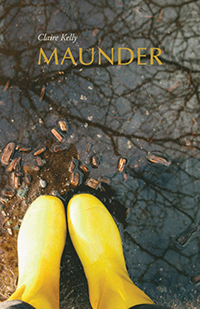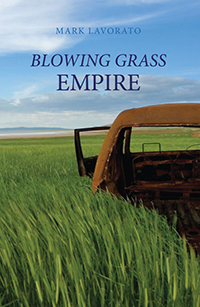Reviews
Poetry Reviews by Will Johnson
Claire Kelly, Maunder (Windsor: Palimpsest, 2017). Paperbound, 72 pp., $18.95.
Mark Lavorato, Blowing Grass Empire (Windsor: Palimpsest, 2017). Paperbound, 72 pp., $18.95.
 Writing poetry these days must feel like fighting off a bear by grabbing hold of its tongue. In Claire Kelly's debut collection, Maunder, there's a piece called "How to survive a bear attack" in which the protagonist does exactly that: "And I says, if you're goin' / to hurt me, I'm goin' / to hurt you too." In a world with no shortage of refugees, where a former reality-TV star accused of sexually assaulting women is president of the United States, and where climate disasters can destroy whole cities, what role can poetry have in helping us heal? Even if we close our eyes to these realities, as Kelly writes in "Keeping Track, Keeping Pace,” "catastrophe is possible even when there's a lack of exertion."
Writing poetry these days must feel like fighting off a bear by grabbing hold of its tongue. In Claire Kelly's debut collection, Maunder, there's a piece called "How to survive a bear attack" in which the protagonist does exactly that: "And I says, if you're goin' / to hurt me, I'm goin' / to hurt you too." In a world with no shortage of refugees, where a former reality-TV star accused of sexually assaulting women is president of the United States, and where climate disasters can destroy whole cities, what role can poetry have in helping us heal? Even if we close our eyes to these realities, as Kelly writes in "Keeping Track, Keeping Pace,” "catastrophe is possible even when there's a lack of exertion."
Kelly's characters are searching for meaning—or not. In “Crows—fire eaters,” they're like "off-duty pallbearers / professional mourners / on a smoke break." It’s those in mourning, who can't cope, who are the ones she fixates on—even though they make others uncomfortable. In "Maundering," she writes, "the jean-clad man in the back pew is crying; the shrewd congregation strains not to hear." The world doesn't always have a place for people's grief, and empathy can only get you so far. Her advice, delivered in "News-Scroll for Dream Junkies": "Don't play with your wounds: they're pink and healthy as watermelons."
For the reader who is grieving (as I was while reading this collection), there is plenty from which to take solace. If, indeed, collision is "the true failure to connect,” (“Street Haunting”) then maybe there's something to salvage from the wreckage. One speaker, in "Honing in the too-early morning" says, "Let us live like labs do. Dig / in the garden for the sake of digging.” Companionship is all that keeps these dogs distracted from the “tragicomic hunger” of the “ever-panting present.”
Though her collection is secular, Kelly’s work is profoundly spiritual and reconciliation is on her mind. In “Curb’ N.” she writes about “a prophesy from one unaccustomed to giving good news,” which seems like an apt way to describe her book. Although there is violence, conflict, and angst throughout, hope comes from our relationships, and from fellowship with our communities. In connecting with each other in our pain and recognizing our unique traumas, she writes "we can be two cans lined up and shot off a wooden fence that settle next to each other, damaged and yet somehow safe, serene.”
 When two jetliners careened into the World Trade Center nearly two decades ago, the speaker in Mark Lavorato's poem “September 11, 2001” was embarking on a serene hike through the mountains. He remembers feeling blessed that "this little world I inhabited / was so unwaveringly peaceful," only learning later of the carnage. The stark contrast reminds readers that although it's a mad world, it's a beautiful one too.
When two jetliners careened into the World Trade Center nearly two decades ago, the speaker in Mark Lavorato's poem “September 11, 2001” was embarking on a serene hike through the mountains. He remembers feeling blessed that "this little world I inhabited / was so unwaveringly peaceful," only learning later of the carnage. The stark contrast reminds readers that although it's a mad world, it's a beautiful one too.
In the title poem of this collection, Lavorato conjures up The Lion King by having an elder take a child to overlook a gorgeous vista. But the message isn't Disney-esque: "You child, are the noble heir to none of it," she says, "No one will remember you." Repeatedly, throughout the text, readers are encouraged to contemplate their own insignificance. Lavorato's been compared to Raymond Carver, and his work can feel similarly bleak. In “Loralee,” one character meets sudden death thusly: "everything she was came to a floating-glass, metal-crumpling end.” In “Monsters,” he writes of a five-year-old that “there are / those who would undo / every golden sinew of that / wide-eyed and trusting form.” As for those lucky enough to continue drawing breath, they can’t make much sense of the world around them. In “Tuesday, 3 a.m.” his character says “I feel like I’m eavesdropping on a song / that I do not have the talent to decipher / being recited through these urban branches / a song that is tireless, that will not sleep.”
So how does the author feel about the universe, sans religion? What are we supposed to take from all of this? The meat of his message seems to be contained in the middle of "Orbital," which describes the Voyager Interstellar Message Project: "In a billion years, when all the water has evaporated from Earth, a lazy recording of Blind Willie Johnson will still be adrift, his plaintive guitar and gospel humming.”
—Will Johnson









